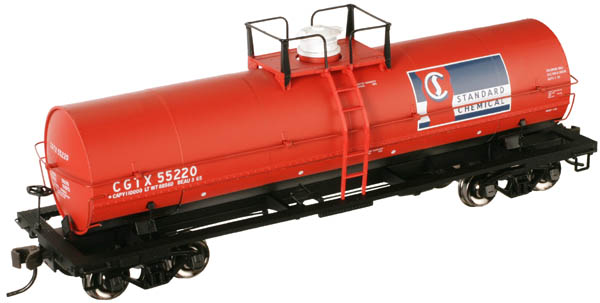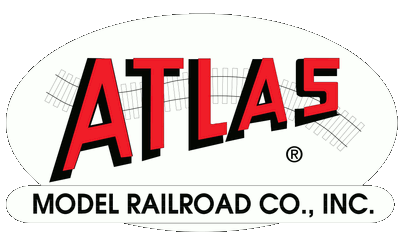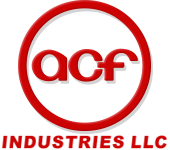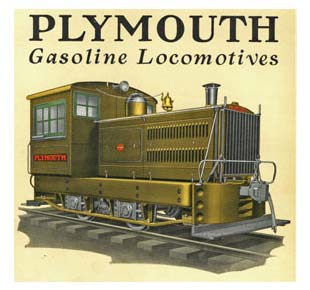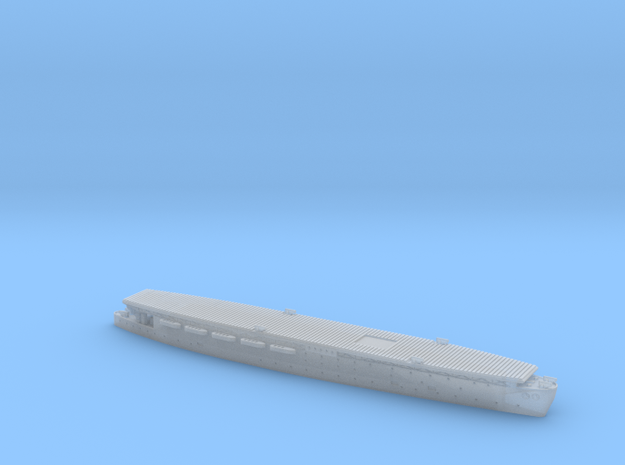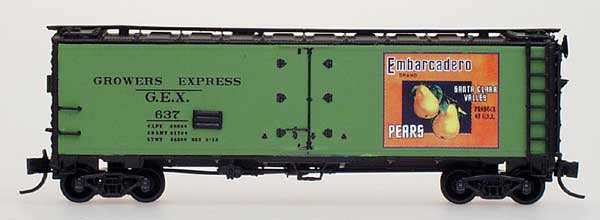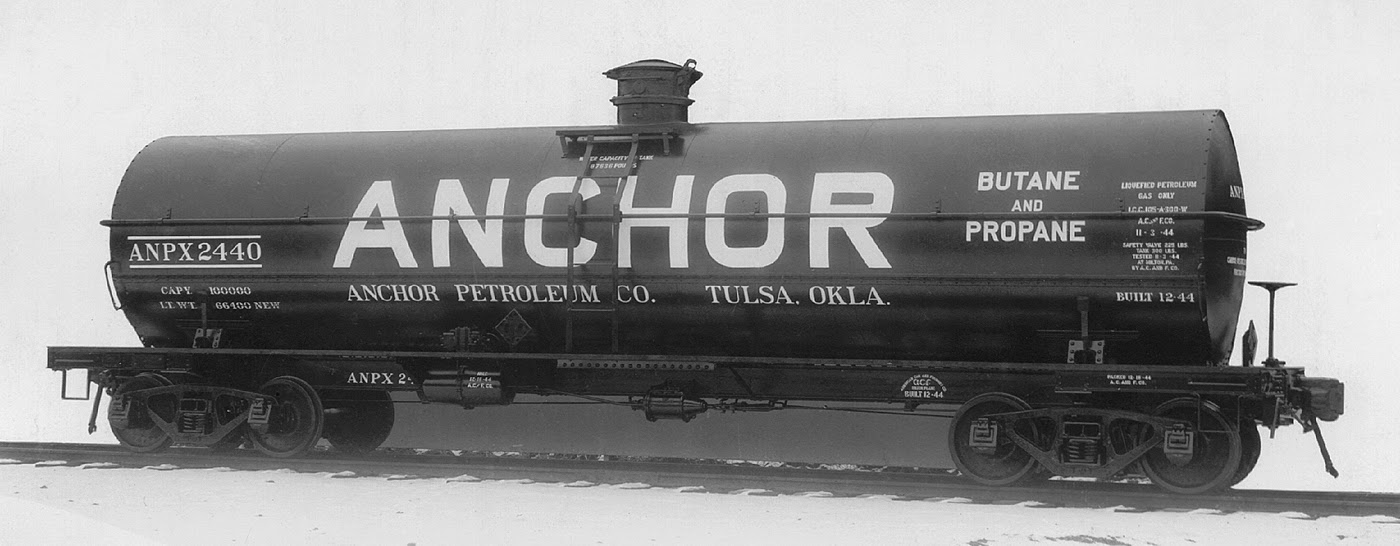Body Style Information: The Atlas model faithfully reproduces this late steam/early diesel era tank car in two versions (with and without platform rails). The cars with top platform rails were used where there was no elevated loading/unloading facility. The cars without the top platform rails were often specified for customers that had access to elevated loading and unloading facilities.
Features: Finely molded handrails Tank fittings and safety placards 50-ton friction-bearing trucks with AccuMate® couplers Accurate painting and lettering Platform where appropriate
Features: Finely molded handrails Tank fittings and safety placards 50-ton friction-bearing trucks with AccuMate® couplers Accurate painting and lettering Platform where appropriate
Prototype Information: American Car and Foundry's 11,000 gallon specialized LPG tank car was designed for transporting Liquid Petroleum Gas (LPG). American Car & Foundry built the Interstate Commerce Commission (ICC) 105A-300W tank car from 1947 through the 1950s in many similar versions. It is an insulated, fusion-welded, high-pressure steel tank with top loading and unloading valves for liquified petroleum gases (LPG). Drawings appear in the Car Builder's Cyclopedias published in the late 1940s and 1950s. The design of ACF's 11,000 gallon ICC-105A tank car changed during the early part of 1951 to mid-1952 whereby the number of jacket sheets changed from 6 to 5. Generally, cars with the 89-1/4" inside diameter tank built from about March 1947 (Lots 3080 & 3083 are earliest I can document) through early 1951 (with some built as late as 1952) had 6 pieces of sheet metal welded together to form the jacket. Most of the ACF-design cars built from mid-1952 through 1954 came with 5 panels. The period from early 1952 through mid-1952 was a transition period where at least three jacket versions were produced. While there are a few exceptions to this general rule, these 6-panel and 5-panel jacket arrangements represented the vast majority of cars built from March 1947 through 1954 (after which time the tank design changed considerably).
LPG cars first began to be produced in modest numbers in the 1930s and by the late 1940s, they were being produced in relatively large numbers. describes flammable hydrocarbon gases including propane, butane and mixtures of these gases. LPG, liquefied through pressurization, comes from natural gas processing and oil refining. LPG is used as heating, cooking and auto fuel. In different countries, what is supplied can be propane, butane or propane-butane blends.
LPG cars first began to be produced in modest numbers in the 1930s and by the late 1940s, they were being produced in relatively large numbers. describes flammable hydrocarbon gases including propane, butane and mixtures of these gases. LPG, liquefied through pressurization, comes from natural gas processing and oil refining. LPG is used as heating, cooking and auto fuel. In different countries, what is supplied can be propane, butane or propane-butane blends.
Brand/Importer Information: In 1924 Stephan Schaffan, Sr. founded the Atlas Tool Company in Newark, New Jersey. In 1933 his son, Stephan Schaffan, Jr., came to work for his father at the age of sixteen. Steve Jr. built model airplanes as a hobby and frequented a local hobby shop. Being an enterprising young man, he would often ask the owner if there was anything he could do to earn some extra spending money. Tired of listening to his requests, the hobby-store owner threw some model railroad track parts his way and said, "Here, see if you can improve on this".
Atlas has made a ton of wonderful products throughout the years and we often get questions one whether we have run a certain road name on a particular model. It should be noted that Atlas locomotives and rolling stock are greatly appreciated for their superior operating and running characteristics. Atlas products are also well known for their outstanding collectability not only due to their superior prototypical workmanship, details and decoration, but because there are relatively so few of them made. Each and every production run has been carefully built to market demand, meaning almost every piece in any given run is sold out by Atlas on arrival or shortly thereafter, thus creating a built in collectors market.
Atlas has made a ton of wonderful products throughout the years and we often get questions one whether we have run a certain road name on a particular model. It should be noted that Atlas locomotives and rolling stock are greatly appreciated for their superior operating and running characteristics. Atlas products are also well known for their outstanding collectability not only due to their superior prototypical workmanship, details and decoration, but because there are relatively so few of them made. Each and every production run has been carefully built to market demand, meaning almost every piece in any given run is sold out by Atlas on arrival or shortly thereafter, thus creating a built in collectors market.
Manufacturer Information: In 1924 Stephan Schaffan, Sr. founded the Atlas Tool Company in Newark, New Jersey. In 1933 his son, Stephan Schaffan, Jr., came to work for his father at the age of sixteen. Steve Jr. built model airplanes as a hobby and frequented a local hobby shop. Being an enterprising young man, he would often ask the owner if there was anything he could do to earn some extra spending money. Tired of listening to his requests, the hobby-store owner threw some model railroad track parts his way and said, "Here, see if you can improve on this".
Atlas has made a ton of wonderful products throughout the years and we often get questions one whether we have run a certain road name on a particular model. It should be noted that Atlas locomotives and rolling stock are greatly appreciated for their superior operating and running characteristics. Atlas products are also well known for their outstanding collectability not only due to their superior prototypical workmanship, details and decoration, but because there are relatively so few of them made. Each and every production run has been carefully built to market demand, meaning almost every piece in any given run is sold out by Atlas on arrival or shortly thereafter, thus creating a built in collectors market.
Atlas has made a ton of wonderful products throughout the years and we often get questions one whether we have run a certain road name on a particular model. It should be noted that Atlas locomotives and rolling stock are greatly appreciated for their superior operating and running characteristics. Atlas products are also well known for their outstanding collectability not only due to their superior prototypical workmanship, details and decoration, but because there are relatively so few of them made. Each and every production run has been carefully built to market demand, meaning almost every piece in any given run is sold out by Atlas on arrival or shortly thereafter, thus creating a built in collectors market.
Item created by: devsummers428 on 2020-06-03 19:13:21
If you see errors or missing data in this entry, please feel free to log in and edit it. Anyone with a Gmail account can log in instantly.
If you see errors or missing data in this entry, please feel free to log in and edit it. Anyone with a Gmail account can log in instantly.


